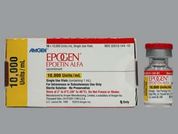Epogen
Epoetin Alfa
What is Epogen used for?
This medication is used to treat anemia (low red blood cell count) in people with long-term serious kidney disease (chronic kidney failure), people receiving zidovudine to treat HIV, and people receiving chemotherapy for some types of cancer (cancer that does not involve the bone marrow or blood cells). It may also be used in anemic patients to reduce the need for blood transfusions before certain planned surgeries that have a high risk of blood loss (usually given with an anticoagulant/"blood thinner" medication such as warfarin to lower the risk of serious blood clots). Epoetin alfa works by signaling the bone marrow to make more red blood cells. This medication is very similar to the natural substance in your body (erythropoietin) that prevents anemia. This monograph is about the following epoetin alfa products: epoetin alfa and epoetin alfa-epbx.
CHEMICAL NAME
DRUG TYPE
Blood Cell DeficiencyEpogen Prices
Searching for the lowest prices
What does Epogen look like?
View all Epogen Image Information (6)Epogen Frequently Asked Questions
If someone has overdosed and has serious symptoms such as passing out or trouble breathing, call 911. Otherwise, call a poison control center right away. US residents can call 1-800-222-1222. Canada residents can call 1-844-764-7669.
IMPORTANT: HOW TO USE THIS INFORMATION: This is a summary and does NOT have all possible information about this product. This information does not assure that this product is safe, effective, or appropriate for you. This information is not individual medical advice and does not substitute for the advice of your health care professional. Always ask your health care professional for complete information about this product and your specific health needs.



